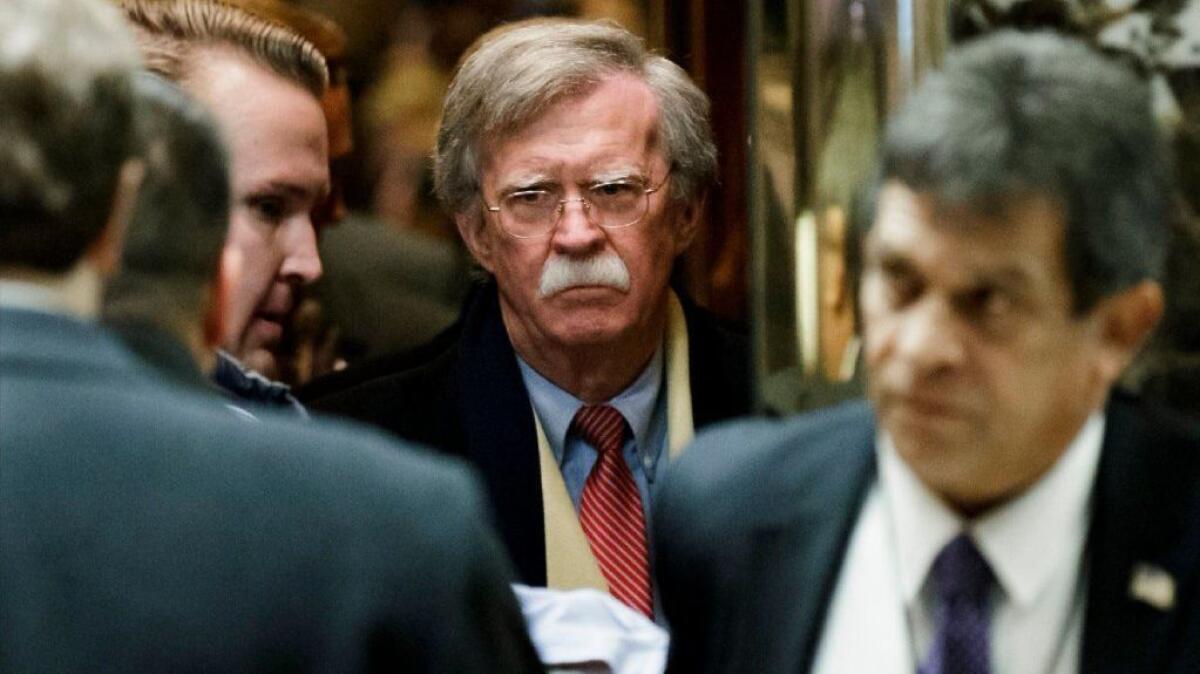John Bolton’s take-no-prisoners style may prove problematic in the White House

- Share via
Reporting from Washington — John Bolton, President Trump’s new national security advisor, has a take-no-prisoners approach that may prove problematic as he tries to manage a White House riven by leaks and defections.
Known for his brash style and bushy mustache, Bolton has been an informal advisor to Trump, a frequent commentator on Fox News and a longtime hawk on Iran, North Korea and other U.S. adversaries.
He is best known for his 16 months service as U.S. ambassador to the United Nations — an organization he frequently said shouldn’t exist — from mid-2005 until the end of 2006. President George W. Bush named him as a recess appointment because the White House knew Bolton was too toxic to win Senate confirmation.
Some State Department officials accused him being so abrasive at the U.N. that he undermined U.S. policies.
Earlier, serving as Bush’s arms-control point man at the State Department, he famously engaged in ideological and personal clashes with subordinates, colleagues and superiors. Even one of his defenders at the time described him as a “knuckle-dragger in a cave.”
More recently, Bolton, 69, has advocated hard-line — some would say extreme — positions on foreign policy challenges that have roiled the Trump administration.
He has vigorously opposed the Iran nuclear deal, and no doubt will back Trump’s threats to withdraw from the landmark accord. Before it was signed in 2015, he suggested bombing Iran to quash its nuclear ambitions.
He also has called for a military attack on nuclear-armed North Korea. Six months ago, as Trump and North Korean ruler Kim Jong Un traded insults and threats, Bolton said the solution was to topple the Pyongyang government and have South Korea take over the North.
In 2003, when Bolton was Bush’s undersecretary for arms control, North Korean leader Kim Jong Il — father of the current dictator — sought to ban him from U.S.-proposed multilateral talks on North Korea’s suspected nuclear weapons program after Bolton criticized Kim publicly while visiting South Korea.
“Such human scum and bloodsucker is not entitled to take part in the talks,” said a North Korean Foreign Ministry spokesman.
Bolton now will backstop Trump’s agreement to conduct a summit with Kim Jong Un, tentatively planned for May, a high-wire diplomatic act that will test both leaders.
Unlike Trump, Bolton is a staunch critic of Russian President Vladimir Putin’s military incursion in Ukraine, although it’s not clear whether he agrees with Trump’s skepticism of Russian meddling in the 2016 presidential election.
Bolton’s defenders include the most conservative members of the Republican establishment. Some welcomed him as national security advisor after H.R. McMaster, whom they saw as more moderate and more inclined to try to block some of Trump’s suggestions.
“Obviously, I think Bolton’s world view is more muscular” than McMaster’s, said Lanhee Chen, a fellow at the conservative Hoover Institution who was Mitt Romney’s chief policy advisor in 2012. “But there clearly are similarities and actually more similarities than people might see at first blush.”
Chen said both men favor an engaged America around the world, a contrast to how many conservatives initially viewed Trump’s “America First” policy as isolationist.
“Some will try to portray him as being out of the mainstream, particularly detractors of the administration, but I don’t actually think that’s where Bolton is,” he said.
Richard Haass, president of the Council on Foreign Relations, said via Twitter, “A national security advisor must be an honest broker, ensuring the [president] considers all points of view. Second, he is a counselor with his own views. … The obvious question is whether John Bolton has the temperament and the judgment for the job.”
But many veterans in the foreign policy, global democracy and human rights communities were appalled.
Bolton “generally disparages international law,” Amnesty International said in a statement.
After the 2016 election, Trump initially considered nominating Bolton as secretary of State but reportedly decided the mustachioed Bolton didn’t “look” the part. Trump instead picked Rex Tillerson, the dapper CEO of ExxonMobil, although he fired Tillerson last week.
A Baltimore native, Bolton was a student organizer for Republican conservative Barry Goldwater’s presidential campaign in 1964, a race that ended in overwhelming defeat. Bolton later worked for Sen. Jesse Helms (R-N.C.), an archconservative who opposed civil rights laws, and in the administrations of Presidents Reagan and George H.W. Bush.
The Yale-trained lawyer earned points in the GOP by helping fight the recount battle in Florida after the razor- thin presidential election in 2000. The Supreme Court ultimately gave the state, and thus the election, to George W. Bush over Democratic nominee Al Gore.
He has been a consistent flame-thrower, critics and supporters agree. When he left a position at the U.S. Agency for International Development in the late 1980s, colleagues presented him with a special gift: a bronzed hand grenade.
More to Read
Sign up for Essential California
The most important California stories and recommendations in your inbox every morning.
You may occasionally receive promotional content from the Los Angeles Times.












